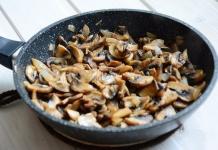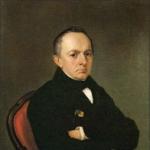Fet's poems struck contemporaries and amaze us with the brightness and consistency of colors, great emotional intensity.
The poet believed that one should create on a whim and inspiration. The subject of art can be nature, love, beauty - and he followed this in his poetic practice. He entered the history of Russian poetry as an original lyric poet, a master of lyrical miniatures.
Nature occupies a significant place in his lyrics; it seems to respond to the feelings of the poet. Man is a particle of living nature, a creature equal to it. The poet liked to depict the transitional states of nature, different times years: autumn, spring, summer and winter - everything is equally beautiful.
Its very significant love lyrics, glorifying the joys and troubles of great human feeling. A whole cycle of poems about love for a woman is dedicated to Maria Lazich, most of them are dramatic.
The prevailing mood in his works is intoxication with nature, beauty, art, memories, delight. These are the features of Fet's lyrics. Often the poet has the motive of flying away from the earth following the moonlight or enchanting music.
Poetry for Fet is pure essence, something like rarefied air on mountain peaks: not a human house, but a sanctuary.
Like any poet, Afanasy Afanasyevich writes about the eternal theme of life and death. He is not equally afraid of death or life. By physical death, the poet experiences only cold indifference, and earthly existence is justified only by creative fire, commensurate in his view with "the whole universe." Both ancient and Christian motifs sound in verse.
In this section you will also find all the best Fet verses that students of grades 1, 2, 3, 4, 5, 6, 7, 8, 9, 10 and 11 pass through the school curriculum. Patriotic poems about Motherland and Russia, about war and freedom. Sad poems about the cemetery and religion, about loneliness, about freedom. Dedications to mother and women. Philosophical reflections about good and evil, about friendship, about the abyss.
Adult readers will like short poems about sleep, satirical poems with obscenities. As well as lyrical, romantic and historical works. And also read dedications, epigrams, romances - and enjoy the pearls of world lyrics.
Poems:
Evening lights
Collection of poems
Sonnet
Out of fashion
Uncle and cousin
Cactus
Kalenik
Goltz family
Articles on poetry and art
Two stickies
Sabina
Dream
Student
Mascot
Letters:
Translations:
Pierre-Jean Beranger
Criticism and publicism:
A.A. Fet about the poems of F. Tyutchev
Memories:
My memories
early years of my life
Early years of my life (excerpts)
Apollo Belvedere (“Stubborn bow, slightly inclined from the sight ...”)
Ball ("When these sounds tremble...")
"Fragrant night, blessed night..."
In the album ("Victory! Unarmed malice ...")
Spring Thoughts ("Birds fly from afar again...")
Spring is in the yard (“How the chest breathes fresh and capaciously ...”)
Evening ("It sounded over a clear river...")
“Here the summer days are diminishing ...”
“Everything is as it used to be, cheerful, happy ...”
“I got up early over the mountain ...” (Moon and rose)
"The depths of heaven are clear again..."
“For a long time in love there is little joy ...”
“For a long time, in the time of your childish ...” (Transformation)
Village (“I love your sad shelter ...”)
“How long will I drink your flickering ...” (To the faded stars)
To a friend ("When suffering is in your chest...")
“Spruce covered my path with a sleeve ...”
"It's still spring, - as if unearthly ..."
"Still fragrant bliss of spring ..."
"More more! Ah, the heart hears...
"I still love, I still yearn..."
Another May night ("What a night! What a bliss for everything! ..")
"Dawn. The edge of the east shines ... "(It is impossible)
"Dawn says goodbye to the earth..."
“By the window, leaning my head ...” (At the window)
“How sad are the gloomy days ...” (Autumn)
“How the chest breathes fresh and capaciously ...” (Spring is in the yard)
“What sadness! End of the alley..."
“What a night! How clean the air...
“What a night! What bliss is on everything! .. ”(Another May night)
“The clouds are swirling, smearing scarlet in the brilliance ...” (Steppe in the evening)
“When suffering is in your chest ...” (To a friend)
"When these sounds tremble..." (Ball)
Bell ("Night is mute, like a disembodied spirit...")
Swallows ("Nature's idle spy...")
"The swallows are gone..."
“We walked through the forest along the only path ...”
"Summer evening is quiet and clear..."
“I love your sad shelter ...” (Village)
“I like to stand in the room at night by the window in the dark ...”
The moon and the rose ("I got up early over the mountain...")
“The one who dared me madness wished for me ...”
“The leaves were silent, the stars glowed ...”
"The stars are praying, twinkling and glowing..."
“Frost and night over the snowy distance ...” (On railway)
Muse (“Do you want to curse, sobbing and groaning ...”)
On the railroad ("Frost and night over the snowy distance...")
"At dawn, don't wake her up..."
“I lean back in my chair and look up at the ceiling…”
"On a haystack at southern night..."
"I can't hear that bird..."
"Do not refer to cold dispassion ..."
It is impossible (“Dawn. The edge of the east shines ...”)
"Bad weather - autumn - you smoke ..."
"No, don't wait for a passionate song..."
“The night is mute, like an incorporeal spirit ...” (Bell)
"Now we heard the first thunder..."
“O first lily of the valley! From under the snow ... "(The first lily of the valley)
"Oh, this rural day and its beautiful brilliance..."
"A wavy cloud..."
"Again, invisible efforts ..."
Autumn ("How sad are the gloomy days...")
Singer ("Take my heart away into the ringing distance...")
The first lily of the valley ("O first lily of the valley! From under the snow...")
"Victory! Malice is unarmed ... "(To the album)
“Understand for once the melancholy confession...” (Anruf an die Geliebte of Beethoven)
“The last sheaf has been brought from the bare fields ...” (Hound hunting)
Why? (“Why, how do you sit illuminated ...”)
"Why, how do you sit illuminated ..." (Why?)
To poets ("The heart trembles gratifyingly and painfully...")
Transformations ("Long ago, in your childish pore...")
"Nature's idle spy..." (Swallows)
“It sounded over a clear river ...” (Evening)
Dog hunting ("The last sheaf brought from the bare fields...")
“I would like to shake your hand again! ..”
“The candle is lit. Portraits in the shadows...»
“The heart trembles gratifyingly and painfully ...” (To poets)
“The night shone. The garden was full of moonlight. They lay ... "
“Again the birds fly from afar ...” (Spring thoughts)
"The sun is setting, and the flying wind has died down..."
The steppe in the evening (“The clouds are swirling, smearing in the brilliance of scarlet ...”)
“The pages are cute again, the fingers opened ...”
"You see, behind the mowers..."
“You want to curse, sobbing and groaning ...” (Muse)
At the window ("By leaning my head against the window...")
Faded stars (“How long will I drink your twinkling ...”)
“The willow is all fluffy ...”
“Take my heart into the ringing distance ...” (to the Singer)
“A stubborn bow, slightly inclined from the sight ...” (Apollo Belvedere)
“Everything around is tired: the color of heaven is also tired ...”
"Learn from them - from the oak, from the birch..."
“Although happiness is not bestowed on me by fate ...”
“What an evening! And the stream...
“What is that sound in the twilight of the evening? God knows..."
"Whisper, timid breath..."
"This morning, this joy..."
"I say that I love meeting you..."
"I came to you with greetings..."
"I won't tell you anything..."
“A bonfire blazes with a bright sun in the forest ...”
Afanasy Afanasyevich Fet is a recognized genius of literature, whose work is cited both in Russia and in foreign countries. His poems, such as “I won’t tell you anything”, “Whisper, timid breathing”, “Evening”, “This morning, this joy”, “At dawn you don’t wake her”, “I have come”, “The Nightingale and the Rose ” and others are now required to be studied in schools and higher educational institutions.
In the biography of Afanasy Fet, there are many mysteries and secrets that still excite the minds of scientists and historians. For example, the circumstances of the birth of a great genius who sang of the beauty of nature and human feelings are like a riddle of the Sphinx.
When Shenshin was born (the name of the poet, which he bore for the first 14 and the last 19 years of his life), is not known for certain. They call it November 10 or December 11, 1820, but Afanasy Afanasyevich himself celebrated his birthday on the 5th of the twelfth month.
His mother, Charlotte-Elisabeth Becker, was the daughter of a German burgher and for some time was the wife of a certain Johann Feth, an assessor at the local court in Darmstadt. Soon Charlotte met Afanasy Neofitovich Shenshin, an Oryol landowner and part-time retired captain.
The fact is that Shenshin, having arrived in Germany, could not book a place in a hotel, because they simply were not there. Therefore, the Russian settles in the house of Chief Kriegskommissar Karl Becker, a widower who lived with a 22-year-old daughter who was pregnant with her second child, son-in-law and granddaughter.

How young girl fell in love with 45-year-old Afanasy, who, moreover, according to the memoirs of his contemporaries, was unsightly himself - history is silent. But, according to rumors, before meeting the Russian landowner, the relationship between Charlotte and Fet gradually came to a standstill: despite the birth of their daughter Carolina, the husband and wife often clashed, besides, Johann got into numerous debts, poisoning the existence of a young wife.
It is only known that from the "City of Sciences" (as Darmstadt is called), the girl, together with Shenshin, fled to snow country, the severe frosts of which the Germans even never dreamed of.
Karl Becker could not explain such an eccentric and unprecedented act of his daughter for those times. After all, she, being a married woman, left her husband and beloved child to the mercy of fate and went in search of adventure in an unfamiliar country. Grandfather Athanasius used to say that “means of seduction” (most likely, Karl meant alcohol) deprived her of her mind. But in fact, Charlotte was later diagnosed with a mental disorder.

Already in Russia, two months after the move, a boy was born. The baby was baptized according to the Orthodox tradition and named Athanasius. Thus, the parents predetermined the future of the child, because Athanasius in Greek means "immortal". In fact, Fet became a famous writer, whose memory does not die for years.
Converted to Orthodoxy, Charlotte, who became Elizaveta Petrovna, recalled that Shenshin treated his adopted son as a blood relative and endowed the boy with care and attention.
Later, the Shenshins had three more children, but two died at a young age, which is not surprising, because due to progressive diseases in those troubled times, infant mortality was considered far from uncommon. Afanasy Afanasyevich recalled in his autobiography "The Early Years of My Life" how his sister Anyuta, who was a year younger, went to bed. Near the girl's bed, relatives and friends were on duty day and night, and in the morning doctors visited her room. Fet remembered how he approached the girl and saw her ruddy face and blue eyes, fixedly looking at the ceiling. When Anyuta died, Afanasy Shenshin, initially suspecting such a tragic outcome, fainted.

In 1824, Johann proposed marriage to the governess who was raising his daughter Caroline. The woman agreed, and Fet, either out of resentment for life, or then, in order to annoy the ex-wife, struck Afanasy out of the will. “I am very surprised that Fet forgot in his will and did not recognize his son. A person can make mistakes, but to deny the laws of nature is a very big mistake, ”Elizaveta Petrovna recalled in letters to her brother.
When the young man was 14 years old, the spiritual consistory canceled the baptismal record of Athanasius as the legitimate son of Shenshin, so the boy was given his last name - Fet, since he was born out of wedlock. Because of this, Athanasius lost all privileges, therefore, in the eyes of the public, he appeared not as a descendant of noble family, but as a "Hessendarstadt subject", a foreigner of dubious origin. Such changes were a blow to the heart for the future poet, who considered himself primordially Russian. For many years, the writer tried to return the name of the person who raised him as his own son, but the attempts were in vain. And only in 1873 Athanasius won and became Shenshin.

Athanasius spent his childhood in the village of Novoselki, in the Oryol province, in his father's estate, in a house with a mezzanine and two outbuildings. The boy's gaze opened up picturesque meadows covered with verdant grass, crowns of mighty trees lit by the sun, houses with smoking chimneys and a church with ringing bells. Also, young Fet got up at five in the morning and, wearing only pajamas, ran to the maids so that they would tell him a fairy tale. Although the spinning maids tried to ignore the annoying Athanasius, the boy eventually got his way.
All these childhood memories that inspired Fet were reflected in his subsequent work.
From 1835 to 1837, Athanasius attended the German private boarding school of Krümmer, where he showed himself to be a diligent student. The young man pored over literature textbooks and even then tried to come up with poetic lines.
Literature
At the end of 1837, the young man went to conquer the heart of Russia. Athanasius diligently studied for six months under the supervision of the famous journalist, writer and publisher Mikhail Petrovich Pogodin. After preparation, Fet easily entered the Moscow University at the Faculty of Law. But soon the poet realized that the subject patronized by Saint Ivo of Brittany was not his path.

Therefore, the young man, without any hesitation, transferred to Russian literature. As a first-year student, Afanasy Fet seriously took up poetry and showed his test of the pen to Pogodin. Having familiarized himself with the works of the student, Mikhail Petrovich gave the manuscripts, which stated: "Fet is an undoubted talent." Encouraged by the praise of the author of the book "Viy", Afanasy Afanasyevich publishes his debut collection "Lyrical Pantheon" (1840) and begins to be published in the literary journals "Domestic Notes", "Moskvityanin", etc. "Lyrical Pantheon" did not bring recognition to the author. Unfortunately, Fet's talent was not appreciated by his contemporaries.
But at one point, Afanasy Afanasyevich had to leave literary work and forget about the pen and inkwell. A black streak has come in the life of a gifted poet. At the end of 1844, his beloved mother died, as well as an uncle, with whom Fet had warm friendly relations. Afanasy Afanasyevich counted on the inheritance of a relative, but his uncle's money unexpectedly disappeared. Therefore, the young poet was literally left without a livelihood and, in the hope of acquiring a fortune, entered military service and became a cavalryman. He rose to the rank of officer.

In 1850, the writer returned to poetry and released a second collection, which received rave reviews from Russian critics. After a fairly long period of time, the third collection of the gifted poet was published under the editorship, and in 1863 a two-volume collected works of Fet was published.
If we consider the work of the author of "May Night" and "Spring Rain", then he was a refined lyricist and, as if, identified nature and human feelings. In addition to lyrical poems, his track record includes elegies, thoughts, ballads, messages. Also, many literary critics agree that Afanasy Afanasyevich invented his own, original and multifaceted genre of "melodies", in his works there are often responses to musical works.

Among other things, Afanasy Afanasyevich is familiar to modern readers as a translator. He translated into Russian whole line poems by Latin poets, and also introduced readers to the mystical Faust.
Personal life
Afanasy Afanasyevich Fet during his lifetime was a paradoxical figure: before his contemporaries he appeared as a thoughtful and gloomy person, whose biography is surrounded by mystical halos. Therefore, a dissonance arose in the minds of poetry lovers, some could not understand how this person, burdened with worldly worries, could so exaltedly sing of nature, love, feelings and human relationships.

In the summer of 1848, Afanasy Fet, who served in the cuirassier regiment, was invited to a ball in the hospitable house of the former officer of the Order Regiment M.I. Petkovich.
Among the young ladies fluttering around the hall, Afanasy Afanasyevich saw a black-haired beauty, the daughter of a retired cavalry general of Serbian origin, Maria Lazich. From that very meeting, Fet began to perceive this girl as or as -. It is noteworthy that Maria knew Fet for a long time, however, she met him through his poems, which she read in her youth. Lazic was educated beyond her years, knew how to play music and was well versed in literature. It is not surprising that Fet recognized a kindred spirit in this girl. They exchanged numerous fiery letters and often flipped through albums. Maria became the lyrical heroine of many Fetov's poems.

But the acquaintance of Fet and Lazich was not happy. The lovers could become spouses and raise children in the future, but the prudent and practical Fet refused an alliance with Mary, because she was as poor as he was. In his last letter, Lazich Afanasy Afanasyevich initiated the breakup.
Soon Maria died: due to a carelessly thrown match, her dress caught fire. The girl could not be saved from numerous burns. It is possible that this death was a suicide. The tragic event struck Fet to the core, and Afanasy Afanasyevich found consolation from the sudden loss of a loved one in his work. His subsequent poems were received with a bang by the reading public, so Fet managed to acquire a fortune, the poet's fees allowed him to travel around Europe.

While abroad, the master of trochaic and iambic met with a wealthy woman from a famous Russian dynasty - Maria Botkina. The second wife of Fet was not good-looking, but she was distinguished by good nature and easy disposition. Although Afanasy Afanasyevich proposed not out of love, but out of convenience, the couple lived happily. After a modest wedding, the couple left for Moscow, Fet resigned and devoted his life to creativity.
Death
On November 21, 1892, Afanasy Afanasyevich Fet died of a heart attack. Many biographers suggest that before his death, the poet attempted suicide. But there is no reliable evidence for this version this moment no.

The grave of the creator is located in the village of Kleymenovo.
Bibliography
Collections:
- 2010 - "Poems"
- 1970 - "Poems"
- 2006 - “Afanasy Fet. Lyrics"
- 2005 - “Poems. Poems»
- 1988 - “Poems. Prose. Letters»
- 2001 - "Prose of the poet"
- 2007 - "Spiritual Poetry"
- 1856 - "Two limes"
- 1859 - "Sabina"
- 1856 - "Sleep"
- 1884 - "Student"
- 1842 - "Talisman"
The future poet was born on November 23 (December 5, according to the new style), 1820 in the village. Novoselki of the Mtsensk district of the Oryol province (Russian Empire).
As the son of Charlotte-Elizabeth Becker, who left Germany in 1820, Athanasius was adopted by the nobleman Shenshin. After 14 years, an unpleasant event occurred in the biography of Afanasy Fet: an error was discovered in the birth record, which deprived him of his title.
Education
In 1837, Fet graduated from the private boarding school of Krimmer in the city of Verro (now Estonia). In 1838 he entered the Faculty of Philosophy at Moscow University, continuing to take a great interest in literature. He graduated from the university in 1844.
Creativity of the poet
In a brief biography of Fet, it is worth noting that the first poems were written by him in his youth. Fet's poetry was first published in the collection "Lyrical Pantheon" in 1840. Since then, Fet's poems have been constantly published in magazines.
Aiming for everyone possible ways to regain his title of nobility, Afanasy Fet went to serve as a non-commissioned officer. Then, in 1853, in Fet's life, there is a transition to the Guards Regiment. Creativity Fet even in those days does not stand still. In 1850, his second collection was published, in 1856 - the third.
In 1857 the poet marries Maria Botkina. Having retired in 1858, without having achieved the return of the title, he acquires land, devotes himself to housekeeping.
Fet's new works, published from 1862 to 1871, make up the cycles "From the Village", "Notes on Freelance Labor". They include novels, short stories, essays. Afanasy Afanasievich Fet strictly distinguishes between his prose and poetry. Poetry is romantic for him, and prose is realistic.
Afanasy Afanasyevich Fet (real name Shenshin) (1820-1892) - Russian poet, corresponding member of the St. Petersburg Academy of Sciences (1886).
Afanasy Fet was born on December 5 (November 23, old style) 1820 in the village of Novoselki, Mtsensk district, Oryol province. He was the illegitimate son of the landowner Shenshin, and at the age of fourteen, by decision of the spiritual consistory, he received the surname of his mother, Charlotte Fet, at the same time losing the right to nobility. Subsequently, he achieved a hereditary noble rank and returned the surname Shenshin to himself, but literary name- Fet - remained with him forever.
Athanasius studied at the verbal faculty of Moscow University, here he became close to Apollon Grigoriev and was a member of a circle of students who were intensively engaged in philosophy and poetry. While still a student, in 1840, Fet published the first collection of his poems - "Lyrical Pantheon". In 1845-1858 he served in the army, then acquired large lands and became a landowner. According to his convictions, A. Fet was a monarchist and a conservative.
The origin of Afanasy Afanasyevich Fet is still not fully understood. According to the official version, Fet was the son of the Orel landowner Afanasy Neofitovich Shenshin and Charlotte-Elizaveta Fet, who had fled from her first husband to Russia. The divorce proceedings dragged on, and the wedding of Shenshin and Fet took place only after the birth of the boy. According to another version, his father was the first husband of Charlotte-Elizabeth Johann-Peter Fet, but the child was born already in Russia and was recorded under the name of his adoptive father. One way or another, at the age of 14, the boy was recognized as illegitimate and deprived of all noble privileges. This event, which overnight turned the son of a wealthy Russian landowner into a rootless foreigner, had a profound impact on Fet's entire subsequent life. Wanting to protect their son from litigation regarding his origin, the parents sent the boy to a German boarding school in the city of Verro (Võru, Estonia). In 1837, he spent half a year in the Moscow boarding school of Mikhail Petrovich Pogodin, preparing to enter Moscow University, and in 1838 he became a student of the historical and philological department of the Faculty of Philosophy. The university environment (Apollon Alexandrovich Grigoriev, in whose house Fet lived throughout his studies, students Yakov Petrovich Polonsky, Vladimir Sergeevich Soloviev, Konstantin Dmitrievich Kavelin, etc.) contributed to the formation of Fet as a poet in the best possible way. In 1840, he published the first collection of A. F. Lyrical Pantheon. "Pantheon" did not produce a particular resonance, however, the collection attracted the attention of critics and opened the way to key periodicals: after its publication, Fet's poems began to appear regularly in Moskvityanin and Otechestvennye Zapiski.
Hoping to receive a letter of nobility, in 1845 Afanasy Afanasyevich enrolled in the cuirassier order regiment stationed in the Kherson province, with the rank of non-commissioned officer, a year later he received the rank of officer, but shortly before that it became known that from now on the nobility gives only the rank of major. During the years of the Kherson service, a personal tragedy broke out in the life of Fet, which left its mark on the subsequent work of the poet. Beloved Feta, the daughter of a retired general, Maria Lazich, died from her burns - her dress flared up from a match accidentally or deliberately dropped. The version of suicide seems the most likely: Maria was a dowry, and her marriage to Fet was impossible. In 1853, Fet was transferred to the Novgorod province, having received the opportunity to visit St. Petersburg frequently. His name gradually returned to the pages of magazines, this was facilitated by new friends - Nikolai Alekseevich Nekrasov, Alexander Vasilyevich Druzhinin, Vasily Petrovich Botkin, who were part of the editorial board of Sovremennik. A special role in the poet's work was played by Ivan Sergeevich Turgenev, who prepared and published a new edition of Fet's poems (1856).
In 1859, Afanasy Afanasyevich Fet received the long-awaited rank of major, but the dream of returning the nobility was not destined to come true then - since 1856 this title was awarded only to colonels. Fet retired and, after a long trip abroad, settled in Moscow. In 1857, he married the middle-aged and ugly Maria Petrovna Botkina, receiving a solid dowry for her, which made it possible to purchase an estate in the Mtsensk district. “He has now become an agronomist - a master to the point of desperation, let go of his beard to his loins ... he doesn’t want to hear about literature and scolds magazines with enthusiasm,” I. S. Turgenev commented on the changes that happened to Fet. And indeed, for a long time, only accusatory articles about the post-reform state came out from the pen of a talented poet. Agriculture. “People don’t need my literature, and I don’t need fools,” Fet wrote in a letter to Nikolai Nikolaevich Strakhov, hinting at the lack of interest and misunderstanding on the part of contemporaries who were fascinated by civil poetry and populist ideas. Contemporaries answered the same: “All of them (Fet’s poems) are of such content that a horse could write them if it learned to write poetry,” this is the textbook assessment of Nikolai Gavrilovich Chernyshevsky.
Afanasy Fet returned to literary work only in the 1880s after returning to Moscow. Now he was no longer the rootless poor Fet, but the rich and respected nobleman Shenshin (in 1873, his dream finally came true, he received a letter of nobility and his father's surname), a skilled Oryol landowner and owner of a mansion in Moscow. He again became close to his old friends: Polonsky, Strakhov, Solovyov. In 1881, his translation of the main work of Arthur Schopenhauer "The World as Will and Representation" was published, a year later - the first part of "Faust", in 1883 - the works of Horace, later Decimus Junius Juvenal, Gaius Valerius Catullus, Ovid, Maron Publius Virgil, Johann Friedrich Schiller, Alfred de Musset, Heinrich Heine and other famous writers and poets. Collections of poems under the general title "Evening Lights" were published in small editions. In 1890, two volumes of memoirs, My Memoirs, appeared; the third, The Early Years of My Life, was published posthumously, in 1893.
By the end of his life, Fet's physical condition became unbearable: his eyesight deteriorated sharply, aggravated asthma was accompanied by asthma attacks and excruciating pains. On November 21, 1892, Fet dictated to his secretary: “I don’t understand the conscious increase in inevitable suffering, I voluntarily go towards the inevitable.” The suicide attempt failed: the poet died earlier from apoplexy.
All Fet's work can be considered in the dynamics of its development. The first verses of the university period tend to glorify the sensual, pagan beginning. The beautiful acquires specific visual forms, harmonious and complete. There is no contradiction between the spiritual and carnal worlds, there is something that unites them - beauty. The search and disclosure of beauty in nature and man is the main task of the early Fet. Already in the first period, tendencies appear that are characteristic of later creativity. The objective world became less clear, and shades of the emotional state, impressionistic sensations came to the fore. The expression of the inexpressible, the unconscious, music, fantasy, experience, an attempt to grasp the sensual, not the object, but the impression of the object - all this determined the poetry of Afanasy Fet in the 1850s-1860s. The later lyrics of the writer took shape largely under the influence of the tragic philosophy of Schopenhauer. The creativity of the 1880s is characterized by an attempt to escape into another world, the world of pure ideas and essences. In this, Fet was close to the aesthetics of the Symbolists, who considered the poet their teacher.
Afanasy Afanasyevich Fet died on December 3 (November 21, old style), 1892, in Moscow.
“His articles, in which he advocated for the interests of the landowners, aroused the indignation of the entire advanced press. After a long break in poetic work, in his seventh decade, in the 80s, Fet published a collection of poems “Evening Lights”, where his work unfolded from new strength.
Fet entered the history of Russian poetry as a representative of the so-called "pure art". He argued that beauty is the only goal of the artist. Nature and love were the main themes of Fet's works. But in this relatively narrow sphere, his talent manifested itself with great brilliance. ...
Afanasy Fet especially masterfully conveyed the nuances of feelings, vague, fleeting or barely nascent moods. "The ability to catch the elusive" - this is how criticism characterized this trait of his talent.




















